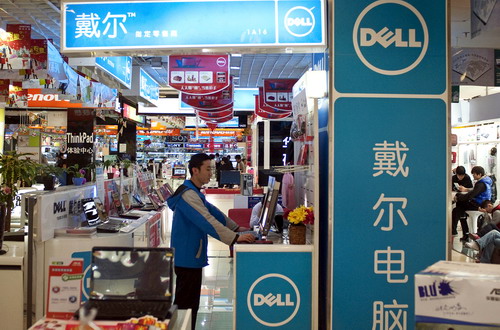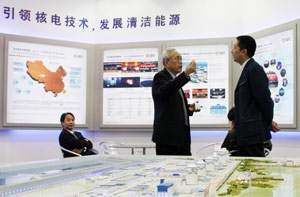It's quality not quantity for Dell
Updated: 2011-10-31 10:09
By Shen Jingting (China Daily)
|
|||||||||||
|
 |
|
A man studying Dell Inc product on sale at a computer market in Beijing. Dell plans to open 1,000 new retail stores for commercial customers in China this year.[Photo/Bloomberg] |
BEIJING - Dell Inc's personal computer market share is declining worldwide but its top management doesn't seem worried.
China's Lenovo Group Ltd was named the world's No 2 personal computer maker by two research firms in mid-October, behind Hewlett-Packard Co and surpassing Dell in terms of third-quarter shipments.
Speaking at a recent media briefing, Dell Chief Executive Officer Michael Dell said his company may ship fewer units than Lenovo but will enjoy greater PC revenues and profits because it sells higher-end machines.
In addition, Dell said his company has grown well beyond its historical role as a maker of personal computers and a direct sales organization. Dell is becoming a one-stop shop with servers, storage and networking, as well as a services business, said the founder, clarifying Dell's transformation and new strategy at a Dell World symposium.
"If I look at our relationship with companies that make airlines, most of our business with them is not products anymore, but services," Dell said, adding that shift has taken approximately 15 years.
In contrast with HP, which in August said it was considering selling or spinning off its PC business, Dell reaffirmed that he still loves hardware but is seeking to explain to customers what else it offers.
The company said it will continue to innovate and invest in hardware, software, services and solutions to better serve customers. The end-user computing isn't just about the PC, workstation, tablet or mobile device; it is about making data accessible and secure regardless of device or location.
Dell has made 11 acquisitions over the past 12 months. It also announced it will invest another $1 billion this fiscal year to extend its global reach into data centers, mobile and cloud environments.
Paul Bell, president of global public and large enterprise at Dell, said: "There are no markets anywhere in the world that are more important to Dell than it (China)." He added China could play a critical role in Dell's transformation process.
"Finance, energy and the telecommunications industry are the three most important industries that we focus on in China," said Bell.
Compared with IT solutions giants such as IBM and HP, Bell said Dell wants to offer products that are simultaneously open, capable and affordable. "Our technology is open and allows customers to make different choices in the future, while other companies don't," he said.
Thomas Zhou, an analyst with International Data Corp (IDC), said Dell is among the top players in China's enterprise IT solutions market, especially in providing servers.
"Almost all the Chinese Internet giants, such as Tencent and Baidu, have adopted Dell products because Dell offers lower-price solutions than IBM and HP," Zhou said.
However, he added Dell lacks a complete product line, especially in the high-end area. He said the company should make more acquisitions to strengthen its capability.
IBM topped the list as the biggest server supplier in China, with a market share of 40.8 percent in the first half of this year. HP had a 25.5 percent market share, while Dell's share was 16 percent during the same period.
Domestic Chinese rivals, such as Lenovo, Huawei and Sugon, also put pressure on Dell. For example, Huawei, the world's No 2 telecom equipment maker, has stepped up its efforts in the "enterprise business" sector. Huawei's global enterprise business revenues reached $2 billion in 2010 and are expected to double this year.
Tina Tian, a telecom analyst with Gartner Inc, said the majority of Huawei's enterprise business is in the telecom industry, but the company showed signs it was able to compete in new areas such as Internet companies.
Related Stories
Baidu, Dell team up for tablets and mobiles 2011-09-06 14:44
Dell looks to SMEs for growth 2011-08-08 17:19
Dell launches low-price 'China-only' tablet to stir sales 2011-07-30 09:44
Dell plans to 'Streak' ahead in tablet PCs 2011-04-08 11:14
- Small businesses seek less room to maneuver
- It's quality not quantity for Dell
- FAW reports $7.88m net loss in Q3
- China train makers' profits slump
- China's first A380 grounded by mechanical fault
- Top financial officials changed in major reshuffle
- Cruise industry sails into new territory
- Non-State companies venture abroad










